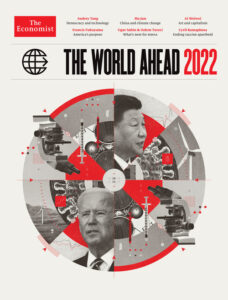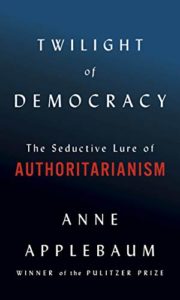 If the world is witnessing a new strategic competition between the world’s democracies and resurgent authoritarians, the latter are demonstrably more resolute, strategic and coordinated, according to a leading analyst.
If the world is witnessing a new strategic competition between the world’s democracies and resurgent authoritarians, the latter are demonstrably more resolute, strategic and coordinated, according to a leading analyst.
If the 20th century was the story of liberal democracy’s progress toward victory over other ideologies—communism, fascism, virulent nationalism—the 21st century is, so far, a story of the reverse, Anne Applebaum writes in the Atlantic’s December cover story. America does still spend money on projects that might loosely be called “democracy assistance,” but the amounts are very low compared with what the authoritarian world is prepared to put up.
The National Endowment for Democracy (NED), a unique institution that has an independent board (of which I am a member), received $300 million of congressional funding in 2020 to support civic organizations, non-state media, and educational projects in about 100 autocracies and weak democracies around the world. Our efforts are even smaller than they look, because traditional media are only a part of how modern autocracies promote themselves, she adds:
We don’t yet have a real answer to China’s Belt and Road Initiative, which offers infrastructure deals to countries around the globe, often enabling local leaders to skim kickbacks and garnering positive China-subsidized media coverage in return. We don’t have the equivalent of a United Front, or any other strategy for shaping debate within and about China. We don’t run online influence campaigns inside Russia. We don’t have an answer to the disinformation, injected by troll farms abroad, that circulates on Facebook inside the U.S., let alone a plan for countering the disinformation that circulates inside autocracies.

The World Ahead 2022
Democracy v autocracy will be one of the coming year’s ten trends to watch, a rivalry that will play out in everything from trade to tech regulation, vaccinations to space stations, according to the Economist’s preview of The World In 2022.
For many human rights NGOs, media groups, and democracy movements, NED and its core affiliates are their only source of financial support, notes Stanford’s Michael McFaul.*
But today’s challenge of rising autocracy requires new players, innovative strategies, and more resources: (1) strengthening the “ideas” part of democratic assistance, rather than continuing to treat democratic development as an engineering problem; and (2) dramatically deepening the networks that connect small-d democrats around the world, he writes for American Purpose:
That is why, on the fortieth anniversary of Reagan’s Westminster speech, Biden and other democratic leaders should use their second democracy summit next year to launch the International Platform for Freedom. NED could be one of the incubators of this platform or the core organization or secretariat for IPF, or the U.S. Agency for International Development (USAID) could play the latter role. Preferably, however, an independent, international NGO affiliated with NED, USAID, and other non-American democracy-supporting organizations would serve this function.
 The 21st century may prove to be both an era of geopolitical competition and an age of intervulnerability, however paradoxical that may seem, in which the two dynamics feed off each other in positive and negative ways, adds analyst Uri Friedman.
The 21st century may prove to be both an era of geopolitical competition and an age of intervulnerability, however paradoxical that may seem, in which the two dynamics feed off each other in positive and negative ways, adds analyst Uri Friedman.
Beyond U.S. borders, the contest between democracy and autocracy should be an open competition to see which governments can deliver more — materially, intellectually, spiritual and all the other ways we measure human flourishing — for their people, New America CEO Anne-Marie Slaughter writes for the Times.
The Biden administration’s Summit for Democracy has the potential to revitalize the fight for freedom worldwide, but only if it generates specific, concrete goals rather than bland policy statements, according to Richard Fontaine, CEO of the Center for a New American Security, and Jared Cohen, founder and CEO of Jigsaw at Alphabet Inc. and an adjunct senior fellow at the Council on Foreign Relations.
 Statements made at a diplomatic summit won’t achieve much if politicians, citizens, and businesses don’t act as if they matter, adds Applebaum, a fellow at the SNF Agora Institute at Johns Hopkins University, and the author of Twilight of Democracy: The Seductive Lure of Authoritarianism.
Statements made at a diplomatic summit won’t achieve much if politicians, citizens, and businesses don’t act as if they matter, adds Applebaum, a fellow at the SNF Agora Institute at Johns Hopkins University, and the author of Twilight of Democracy: The Seductive Lure of Authoritarianism.
The same is true of the fight for human rights. Statements made at a diplomatic summit won’t achieve much if politicians, citizens, and businesses don’t act as if they matter. We need a major investment in independent media around the world, a strategy for reaching people inside autocracies, new international institutions to replace the defunct human-rights bodies at the UN. We need a way to coordinate democratic nations’ response when autocracies commit crimes outside their borders—whether that’s the Russian state murdering people in Berlin or Salisbury, England; the Belarusian dictator hijacking a commercial flight; or Chinese operatives harassing exiles in Washington, D.C. As of now, we have no transnational strategy designed to confront this transnational problem.
Nature abhors a vacuum, and so does geopolitics. If America removes the promotion of democracy from its foreign policy, if America ceases to interest itself in the fate of other democracies and democratic movements, then autocracies will quickly take our place as sources of influence, funding, and ideas, Applebaum concludes. RTWT
Don’t miss this timely discussion c/o fmr @ThinkDemocracy fellow & @NEDemocracy Lipset lecturer @MungiuPippidi.
Are the US and the EU Parting Ways on Democracy Promotion? Join ERCAS #Democracy Series’ third debate with Thomas Carothers and @YoungsRichard, moderated by Alina Mungiu-Pippidi. Wed, Nov 17 | 7pm – 8pm CET | on Zoom. Register: https://t.co/klhAgjcmdm pic.twitter.com/232Bf2Ask7
— Alina Mungiu-Pippidi (@MungiuPippidi) November 16, 2021







